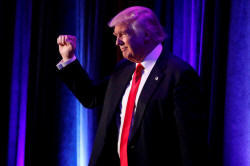|
Investor optimism, global
economic reality may clash in 2017
 Send a link to a friend
Send a link to a friend
 [December 16, 2016]
By Ross Finley [December 16, 2016]
By Ross Finley
LONDON
(Reuters) - Investors sound optimistic about a breakout for the world
economy next year, but for all the talk of huge tax cuts from the
incoming U.S. presidency of Donald Trump, the economic outlook looks
similar to 2016: uneven and unspectacular.
Accelerating inflation and a soaring U.S. dollar as the Federal Reserve
raises interest rates are also risks to the economic balance, magnified
by that pending stimulus.
Much may hinge on financial markets, which for a brief period around the
start of this year looked like their fretting over China might throw the
global economy off track. There is plenty more uncertainty about trade
with China now than then.
So, many of the several hundred professionals polled by Reuters
worldwide say the global trade slowdown during the world economy's
lukewarm recovery from financial crisis that started nearly a decade ago
could worsen.
Emerging economies will remain vulnerable. Brazil's persistent,
crippling recession is way out of line with its soaring stock market,
and much of Asia will grow below potential, putting the latest global
growth forecast for the year ahead at 3.2 percent, less optimistic than
it was this time last year.

For the developed world, meanwhile, it has been productivity gains that
have been lacking for so long and policymakers remain at a loss on the
reasons why, and how to remedy the problem.
The U.S. jobless rate is already down to 4.6 percent and hiring slowing,
so economists say improving growth in output per worker will be crucial
for prosperity.
"Mr. Trump and his team have promised growth of 3.5 to 4 percent or
more, which we see as 'magical thinking' unless accompanied by
accelerated productivity growth," noted Michael Carey, U.S. economist at
CA-CIB in New York.
(For interactive graphic economic outlook from Reuters polls, click
http://tmsnrt.rs/2e7JFpt)
MARKETS OUT OF STEP
The most optimistic U.S. growth forecast for any point in 2017 in a
Reuters poll taken a month after Trump's shock election victory was 3.8
percent, well short of the peak rate in a business cycle that is already
mature by past standards.
The consensus, in line with the Fed's view, is a little above 2 percent.
That is similar to a Reuters poll outlook for 2016 in a series of
forecasts made a year ago on growth, rates, inflation and foreign
exchange that were broadly accurate.
Such lukewarm growth does not compute with another set of wildly bullish
stock market views, although it is clear many strategists who initially
said Trump would be a threat to markets have abruptly changed their
minds since the election.
Strategists foresee a rising U.S. dollar, already at a 14-year high, and
U.S. Treasury yields edging up as the Fed follows through with more rate
hikes next year. But Wall Street isn't convinced yet there will be three
more.
A rising dollar may blunt future performance of U.S. companies, many
dependent on international business for revenue. Many of their share
prices trade near record highs, but propped up by buyback schemes and
stimulus, not business investment.
[to top of second column] |

Republican presidential nominee Donald Trump arrives for his
election night rally at the New York Hilton Midtown in Manhattan,
New York, U.S., November 9, 2016. REUTERS/Andrew Kelly/File

Dollar
strength, weakening other currencies, will also influence how emerging markets
manage relatively higher inflation, as well as wilting business confidence.
But for all the talk of trade barriers, oil prices rising on supply cuts, and
planned U.S. tax cuts and infrastructure spending, the global inflation outlook
hasn't changed much, even if the Fed is sounding more worried about it.
The Fed's preferred inflation gauge is forecast to average 1.8 percent next
year, in line with its own view. ]
POLITICAL RISK RISING
The world's second largest economy, China, has turned up slightly this year, but
built on a government borrowing binge and a partly-managed weaker currency.
Growth is forecast to slow, and tensions between Beijing and the incoming Trump
administration are already flaring.
Even
India's economy - the fastest-growing in the world this year - is bracing for a
growth hit from a radical government move to replace huge swathes of its
currency in circulation.
One bright spot is the recent acceleration in euro zone growth as the European
Central Bank continues buying tens of billions of euros worth of bonds each
month, keeping the euro under pressure and making exports relatively cheaper.
But elections in Germany, France and the Netherlands threaten to further
challenge the status quo just as economic effects from expected formal divorce
proceedings start to appear after Britain's shock vote in June to leave the
European Union.

The potency of global monetary policy is fading too, and further out of synch
with the Fed's tightening campaign. The ECB and other major central banks like
the Reserve Bank of India and the Central Bank of Brazil, are expected to ease
more.
(Additional reporting by Krishna Eluri and Purnita Deb. Editing by Jeremy Gaunt)
[© 2016 Thomson Reuters. All rights
reserved.] Copyright 2016 Reuters. All rights reserved. This material may not be published,
broadcast, rewritten or redistributed. |